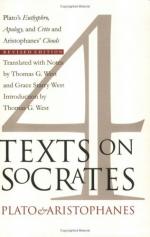
|
| Name: _________________________ | Period: ___________________ |
This test consists of 5 multiple choice questions, 5 short answer questions, and 10 short essay questions.
Multiple Choice Questions
1. What does Socrates say about the accusation that he is engaged in scientific pursuits?
(a) He studied science only as a naive child of seven.
(b) He admits to pursuing science, but argues that science and religion are one and the same.
(c) He admits to being a lover of science, dealing his defense another blow.
(d) He denies being engaged in any such pursuits.
2. Why are many scientists accused of atheism, according to Socrates?
(a) They have never been properly exposed to religious concepts.
(b) Scientists must disavow Zeus in order to be admitted as a scientist.
(c) It is yet another lie perpetrated by Meletus.
(d) Scientists will not accept religious explanations for things.
3. What emotion did Socrates stir in the jury by his suggestion of a punishment?
(a) Thoughtfulness.
(b) Anger.
(c) Admiration.
(d) Laughter.
4. What sentence does Meletus suggest for Socrates?
(a) Death.
(b) A fine.
(c) An imprisonment of one year.
(d) An imprisonment of ten years.
5. Which is the second of three Socratic dialogues written by Plato?
(a) Apology.
(b) The Clouds.
(c) Crito.
(d) Euthyphro.
Short Answer Questions
1. According to Socrates, what is dangerous about the conclusion that human good is related to what is dear to the gods?
2. What is the name of Zeus' father?
3. Which is the first of three Socratic dialogues written by Plato?
4. How does Socrates compare death to sleep?
5. What did the oracle at Delphi tell Socrates?
Short Essay Questions
1. According to Socrates, can wise men access objective truth? If so, how should they go about this?
2. Describe Socrates' account of his encounter with the oracle at Delphi and how it relates to his status as a wise man.
3. Why is Socrates charged with corrupting the youth? Why do the youth follow his philosophy and ideas?
4. What first definition of piety is provided in Euthyphro? What does the character providing the definition cite as an example that proves his definition?
5. What second definition of piety is offered by Euthyphro in Euthyphro?
6. What is the nature of Socrates' comparing himself to Achilles? What is Socrates illustrating with this comparison?
7. How does Socrates use the concept of love to refute the initial definition of piety provided in Euthyphro?
8. Is Socrates innocent or guilty of the charges against him, in the eyes of Athens and its legal system?
9. According to Socrates, what reputation does he suffer from in Athens? How is this reputation related to Aristophanes' Clouds?
10. When he is found guilty, what sentence does Socrates suggest as punishment?
|
This section contains 1,002 words (approx. 4 pages at 300 words per page) |

|




